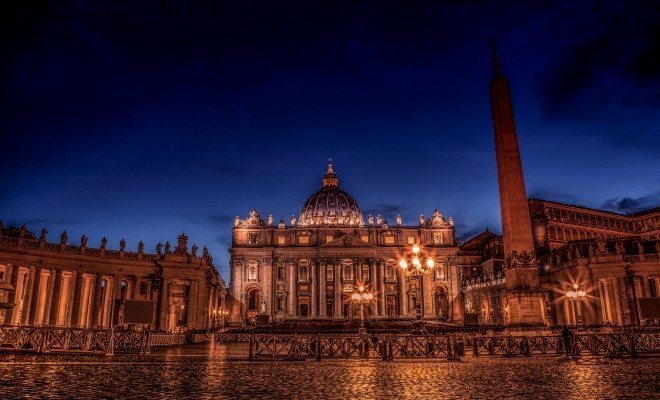 "Vaticano di notte" courtesy of [Espada Din via Flickr]
"Vaticano di notte" courtesy of [Espada Din via Flickr]
World
Reckoning in Rome: A Look at the Ballarat Abuse Scandal
Pope Francis has received accolades from around the world regarding his message of tolerance and his commitment to opening the Catholic church to populations that were historically excluded. However, there is a shadow hanging over his tenure that has yet to be fully addressed: decades of sexual abuse scandals involving Catholic priests that have come to light over the past decade.
Pope Francis has publicly condemned the perpetrators but has also been criticized for not doing more to renounce the culture of turning a blind eye to sexual abuse. This weekend, one of Pope Francis’ most trusted advisers, Cardinal George Pell, former Archbishop of Sydney, was asked to reckon with the consequences of participating in that culture. In Rome, Pell is known as the Secretariat of the Economy and has led sweeping reforms of the traditional Vatican system but in the city of Ballarat, Australia, Pell has become a household name for a much more sinister reason.
Pell provided testimony in Rome this weekend regarding an alleged cover-up of a sexual abuse scandal in Australia. Victims of clerical sexual assault claim that Pell knowingly let pedophile priests escape legal punishment and continue to assault numerous children throughout Australia. One of the most chilling examples of abuse comes from Ballarat, a town where dozens of survivors have stepped forward over the past five years, after decades of abuse. Read on for an introduction to the Ballarat abuse scandal.
Abuse in Ballarat
Ballarat is a city in the state of Victoria, Australia. As of May 2015, 14 Catholic priests have been accused of sexual abuse. Survivors provided testimony in 2015, citing abuse that spanned from the 1960s to the 1990s. Multiple abuse victims from Ballarat committed suicide before they ever saw their day in court, but those who did presented names, dates, and precise details about their abusers. The most prolific offender was Gerald Ridsdale, who was accused of over one hundred acts of abuse. Ridsdale pleaded guilty in 2006 to 35 charges of assault but many victims felt that his sentence of a maximum of thirteen years in jail was too lenient.
Cardinal Pell has been accused of moving Ridsdale from parish to parish for two decades rather than reporting his activities to law enforcement or removing him from the Church entirely. David Ridsdale, who was abused by his uncle, has stated that he attempted to speak about his abuse in 1993 but was silenced by Cardinal Pell. After David Ridsdale reported his uncle, Pell allegedly replied “I want to know what it will take to keep you quiet.” Pell has stated that he never bribed either Ridsdale or his family, but that accusation was bolstered by testimony from another witness who cited Pell brushing off a report of sexual abuse at St. Patrick’s College. The Royal Commission that is overseeing the abuse cases in Ballarat has discovered that abuse committed by several other priests was reported to their superiors but each time, the abuse was ignored and the priests were either moved to different parishes or sent on “treatment” trips.
Pell was summoned to give evidence in Melbourne earlier this year, but his legal team declared he was not healthy enough to fly and instead organized a video-conference from Rome. Upon realizing that Pell would not be coming to Australia, a national crowd-funding campaign was launched to fly Australian sexual abuse victims to Rome to speak with Pell face-to-face. The campaign raised over $200,000 in a matter of days, which paid for the travel expenses of 14 victims and their advisors. The stage was set for a significant confrontation between the upper echelon of the Catholic hierarchy and the survivors whose stories were denied for most of their lives.
Controversial Coverage
The controversy over Pell has led to significant rifts in public discourse. Columnist Andrew Bolt, who calls himself a close friend of Pell, wrote a piece earlier this month claiming that Pell is an innocent man who has become the target of a national “witch hunt.” Bolt argues that public opinion has turned harshly against Pell, who he considers to be an advocate for sexual abuse victims. Bolt describes how Pell has met with abuse victims in the past and how, in 1996, Pell founded the Melbourne Response initiative, which was tasked with investigating sexual abuse allegations made against priests.
However, questions have been raised about how independent the Melbourne Response has been during its tenure, especially after a controversial “60 Minutes” interview (featured below) that explored Pell’s involvement in the Ballarat cases. Bolt also accused reporter Lucie Morris-Marr of launching a smear campaign against Pell after she reported that police were investigating reports that Pell himself had abused children. Morris-Marr defended her story, arguing that she published the piece after a thorough investigation with no intention of libel. Multiple news outlets picked up Morris-Marr’s piece, which led the Victoria police to announce a crackdown on leaking information to the media, even though the police have not formally acknowledged if they are investigating Pell for abuse. Cardinal Pell denied the allegations, but as press attention shifts towards his testimony in Rome this weekend, they may resurface in the coming days.
Pell has not yet been formally charged with obstructing justice or failing to report abuse but there are already calls for his resignation. Victims of the Ballarat abuse scandal have already named the priests who assaulted them and some, such as Ridsdale, have already received sentences, but many argue that the rift between these survivors and the Catholic Church will not be truly healed unless Pell is asked to accept responsibility for his failure to remove these priests.
Other Vatican Controversies Over Abuse
Ballarat is not the only parish where reports of sexual abuse have allegedly been swept under the rug. In 2011, a 1997 letter from Vatican leadership was released to the public. The letter told Irish bishops not to report suspicions of child abuse to the police, but instead to handle abuse as they saw fit under canonical religious law. The letter came as a response to a 1996 initiative of “mandatory reporting” that Irish priests enacted to identify sexual abuse within the church.
There is also criticism over a recently released Vatican document that holds that even though bishops should be aware of local legal procedures, they are not obligated to report clerical child abuse to law enforcement. The document was part of training program for new bishops and was written by Tony Anatrella, a consultant to the Pontifical Council on the Family. The Guardian reports that
While acknowledging that ‘the church has been particularly affected by sexual crimes committed against children,’ the training guide emphasizes statistics that show the vast majority of sexual assaults against children are committed within the family and by friends and neighbors, not other authority figures.
Anatrella’s training document was published just a few days after Peter Saunders, a British victim of abuse serving on the papal advisory commission on clerical sexual assault, was forced out of his position via a vote of no confidence. The vote of no confidence came after Saunders was accused of being difficult to work with and too familiar with the media. The commission announced publicly that Saunders would be taking a leave of absence but Saunders told the press that he had no knowledge of that decision and that he refuses to step down unless Pope Francis officially asks him to. Saunders has been critical of the commission since it was formed two years ago, but as one of two survivors appointed to the commission by Pope Francis, his presence was considered an important victory for victims who want to participate in the discussion. His removal, whether or not it gets Pope Francis’ stamp of approval, may be viewed as a significant step backward in creating open dialogue and building trust between abuse survivors and the bureaucracy of the church.
Conclusion
The sexual abuse that Catholic priests engaged in for decades around the world is a heinous crime not only in its nature but because of the sheer scale on which it was committed. It is not only the priests who abused children who must be held accountable in court, it is also their superiors who ignored allegations of sexual assault over extended periods of time. The last decade has seen a sharp rise in victims coming forward, sharing their stories and formally testifying in court about their experiences, which will hopefully hold the Church accountable for its actions. As Pope Francis tries to usher in a new brand of Catholicism, investigations like the Ballarat case serve as a constant reminder of exactly how much reform is still needed to redress the past crimes. Pell’s testimony in Rome this weekend may not have deviated from the statements he made last year during the investigation conducted by Australia’s Royal Commission but the attention that the conference has garnered has put Pell in the spotlight, not just in Australia, but on the world stage.
Resources
New York Times: After Criticism, Pope Francis Confronts Priestly Sexual Abuse
New York Times: Vatican Letter Warned Bishops on Abuse Policy
LA Times: Catholic Sex Abuse Hearing Will Take Place in the Dead of Night in a Hotel in Rome
The Age: Ballarat Abuse Survivors Head to Rome to see Cardinal George Pell Give Evidence
The Age: Victoria Police Refer Leak of Investigation into Cardinal George Pell to IBAC
The Guardian: George Pell Tried to Bribe Abuse Victim, Royal Commission Hears
The Guardian: Ballarat Priests Involved in Child Sex Abuse sSent on ‘Treatment’ Trips, inquiry told
FT: Australia Clerical Sex Abuse Victims Travel to Rome
Herald Sun: Cardinal George Pell is the Victim of a Vicious Witch Hunt
News.Com.Au: 60 Minutes Reporter Tara Brown Digs Deep into George Pell’s Melbourne Response
Reuters: Critic of Vatican Refuses to Step Down from Sex Abuse Commission








Comments